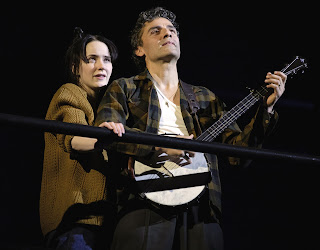Lorraine Hansberry only lived long enough to see two of her plays produced. The first was A Raisin in the Sun, celebrated when it opened in 1959 as the first play by an African-American woman to be performed on Broadway and now a revered part of the theatrical canon that has so far had five major revivals here in New York and countless others around the country.
The second was The Sign in Sidney Brustein’s Window, which limped through a three-month run that ended in 1965 just two days before Hansberry died from pancreatic cancer at the age of 34 and that play has rarely been seen since then.
So when I heard that the Brooklyn Academy of Music was giving Sidney Brustein its first major revival in New York and that it would be starring the power players Oscar Isaac and Rachel Brosnahan, I made sure to buy a ticket within an hour of they’re going on sale last year and made my way out to Brooklyn last weekend. What I saw wasn’t exactly what I expected but I’m so glad I got to see it.
Hansberry’s script is brimming with ideas and wit and passion. But it’s also filled with too many characters, meandering storylines and more political themes than a State of the Union address. “The truth must be faced,” New York Times critic Howard Taubman wrote when the original production opened, “Miss Hansberry's play lacks concision and cohesion.”
I can’t argue with that but what’s missing from Taubman's review and others at the time is an appreciation for how much ambition this play shows. For while Raisin focused almost entirely on a poor black family’s struggle to better their lives, Hansberry did something in Sidney Brustein that is still rare for playwrights of color to do: she wrote about white people. And they’re not just generic white people but the kind of white bohemians that Hansberry knew well when she lived in Greenwich Village in the early 1960s.
As the play opens its title character Sidney has just traded in one failing enterprise (a local nightclub that didn't serve alcohol) for another (a community newspaper that won’t engage with local politics). He can do these things because he’s financially supported by his wife Iris, a would-be actress who works as a waitress and whom he idolizes and puts down as the mood strikes him.
Their motley crew of friends and relatives include their upstairs neighbor David, a gay playwright whose latest work has become a surprise hit; Wally, a glad-handing reform politician; Iris’ sisters Mavis, an Upper East Side matron stuck in a marriage of convenience, and Gloria, a free-spirited but fragile call girl; and Alton, a biracial ex-communist who’s in love with Gloria.
Race aside, each of them represents an aspect of Hansberry herself, who grew up in an affluent family (her father was a big realtor in Chicago) wrote for progressive magazines before moving into playwrighting, married a white man even though she was a lesbian, and remained a committed activist who was a fellow traveler if not an out-and-out member of the communist party.
Sidney Brustein refuses to let any of Hansberry’s disparate alter egos off the hook, zeroing in on the self-delusions of each of the characters in the play. How much, it asks, are they willing to pay for their pipe dreams? The sign in the title refers to the one that Sidney hangs when he impulsively decides to drop his apolitical stance and endorse a candidate—only to ultimately regret doing so.
Hansberry’s efforts to wrestle with the many themes in this play can come off as pedantic in some places and as superficial in others. But much of that might have been ironed out (and the three-hour running time trimmed) if she could have focused on the play during its rehearsal period instead of literally fighting to stay alive. Her ex-husband and literary executor until his death in 1991 made some later revisions to the script but that’s hardly the same.
So kudos to director Anne Kauffman, who also did an earlier production of Sidney Brustein in Chicago back in 2016, for being such a steadfast ally of the play and for staging a production that is as engaging as most of this one is (click here to read about how it came together).
Now there are some hiccups in the production. Some of the costumes for Iris look as though they'd be more at home on Park Avenue than in Washington Square Park. And I still can’t figure out why three of the actors set up chairs in front of the stage to watch their colleagues perform a few scenes. But Kauffman’s casting works beautifully.
Brosnahan, now best known for her turn as a Joan Rivers-style comic in the Amazon Prime series “The Marvelous Mrs. Mazel,” is poignant here as a less assertive woman struggling to define who she is at the dawn of the modern feminist era. Meanwhile Isaac brings his trademark intensity to a man who yearns to be great but knows he lacks the capacity to be so.
Watching them made me wish that Hansberry could see them too, and made me wish even more that she'd been able to give us lots of other works for actors and audiences to explore.

No comments:
Post a Comment